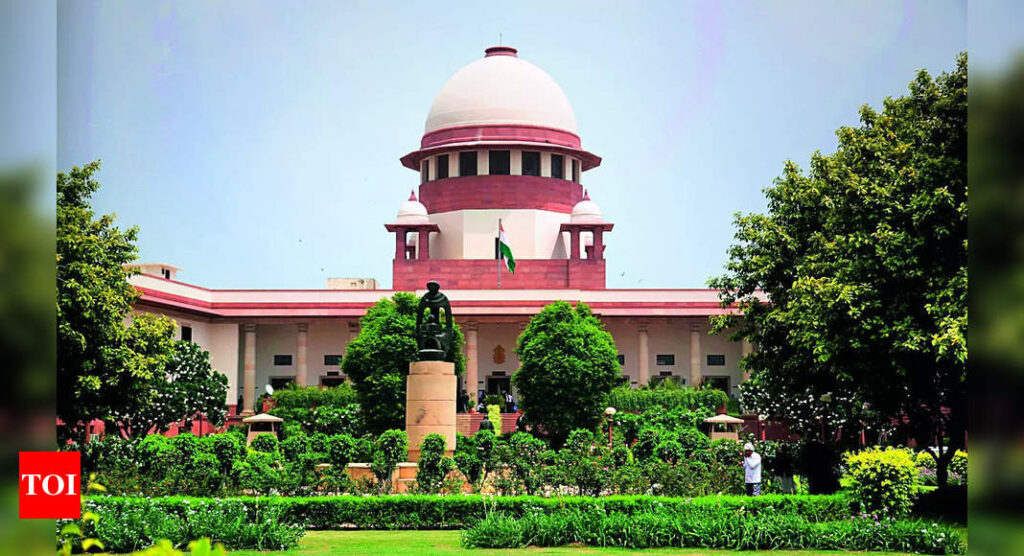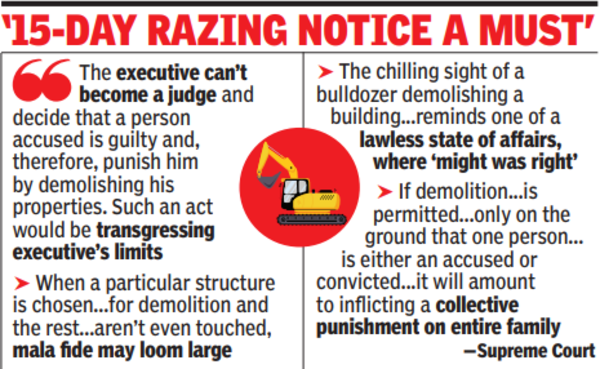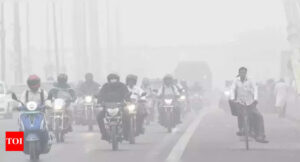SC bans ‘bulldozer justice’, calls it unconstitutional, drafts norms | India News

NEW DELHI: Imposing a pan-India ban on instant ‘bulldozer justice’, Supreme Court on Wednesday said demolition of a citizen’s house merely because he is an accused or even a convict, that too without following the due process as prescribed by law, will be “totally unconstitutional”. It laid down a lengthy process for razing illegal structures and ruled that a state cannot breach a family’s right to shelter by demolishing their house only because one of its members is accused of a heinous crime.
A bench of Justices B R Gavai and K V Viswanathan, which had taken suo motu cognisance of demolition of houses and properties belonging to families of accused in many states, especially in Uttar Pradesh, ordered strict compliance of the SC-laid down procedure for removal of illegal structures and warned of serious consequences for officers indulging in wanton demolition of private properties.
“Violation of any of the directions would lead to initiation of contempt proceedings in addition to prosecution of officers. If demolition is found to be in violation of orders of this court, the officers would be held responsible for restitution of the demolished property at his/their cost in addition to payment of damages,” the bench said.

‘Executive’s abuse of power can’t be tolerated by courts’
Beginning the 95-page judgment by quoting famous Hindi poet Pradeep to illuminate the importance of shelter for a family, Justice Gavai said, “The chilling sight of a bulldozer demolishing a building, when authorities have failed to follow the basic principles of natural justice and have acted without adhering to the principle of due process, reminds one of a lawless state of affairs, where ‘might was right’.”
Justice Gavai pointed out that mere registration of an FIR naming a person, even in a heinous crime, did not erase his right embodied in the concept of ‘innocent till proven guilty in a court of law’. “The executive cannot pre-judge the guilt of an accused and pronounce a disproportionate punishment, that too demolition of a house,” he said.
“In our Constitution, which rests on the foundation of ‘the rule of law’, such high-handed and arbitrary actions have no place. Such excesses at the hands of the executive will have to be dealt with by the heavy hand of the law. Our constitutional ethos and values would not permit any such abuse of power, and such misadventures cannot be tolerated by the court of law,” Justice Gavai said.
The instant deployment of bulldozers to raze an accused person’s house, co-owned and inhabited by other members of the family who are innocent, amounted to “inflicting collective punishment on them without reason”, the apex court said and underlined that right to shelter is part of right to life guaranteed under Article 21 of the Constitution.The bench raised several questions on the practice of bringing down of an accused person’s house.
“Can the family be penalised by demolishing the property without them even being involved in any crime only based on them being related to an alleged accused person? What is their mistake if their relative is arrayed as an accused in some complaint or FIR?” it asked.“As is well known, a pious father may have a recalcitrant son and vice versa. Punishing such persons who have no connection with the crime by demolishing the house where they live in, or properties owned by them, is nothing but an anarchy and would amount to a violation of the right to life guaranteed under the Constitution,” it added.
Justices Gavai and Viswanathan said under India’s constitutional scheme and criminal jurisprudence, it was impermissible to demolish a house belonging to a family merely because one of its members was involved in a crime because it amounted to “inflicting a collective punishment on the entire family or the families residing in such structure”.
When solicitor general Tushar Mehta said every demolition has to be carried out in strict adherence to the procedure laid down, the bench said it has come to light that authorities have adopted a “pick and choose” attitude towards illegal structures, singling out those belonging to the accused while sparing similar ones in the vicinity. “When a particular structure is chosen all of a sudden for demolition and the rest of the similarly situated structures in the same vicinity are not even being touched, mala fide may loom large,” the bench said.
“In such cases, where the authorities indulge in arbitrary pick and choose of structures and it is established that soon before initiation of such an action an occupant of the structure was found to be involved in a criminal case, a presumption could be drawn that the real motive for such demolition proceedings was not the illegal structure but an action of penalising the accused without even trying him before the court of law,” it said.
“No doubt, such a presumption could be rebuttable. The authorities will have to satisfy the court that it did not intend to penalise a person accused of demolishing the structure,” the bench added.



